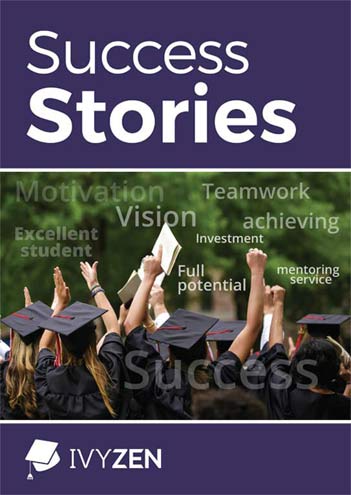I met Matthew through a referral from a previous student’s mother, and from the first time I met him, I knew that he was a math guy. In my initial consultation with him, I noticed how each of his answers were calculated and rational, and judging by his appearance, he definitely wasn’t the artistic type.
When he told me that his favorite subject is math, I wanted to know more about why he liked the subject so much. In my years of consulting, I’ve met many students who like math, but after I prod them for their reasoning, the usual explanation that I get is that they like math because they’re good at it, but not Matthew. He seemed to genuinely like the process of problem solving, and the objective nature of math solutions satisfied him much more than the opinion papers he wrote in English class. I knew that he would be perfect for the Number Theory Theme.
At IvyZen, we stress the importance of theme because we know that it works. Without a theme, students are rudderless and look confused and unappealing to the college admissions officers at top schools. The number theory theme (colloquially the “math nerd” theme) was perfect for Matthew for a number of reasons: 1) he seemed more interested in math research than going into finance and making a lot of money, 2) he was already part of his school’s math club, and 3) he actually enjoyed learning about mathematics.

Download our free Success Stories pdf for 6 success stories (with full student profiles) of students who gained admissions to Columbia, MIT, Caltech, Dartmouth and more!
In college consulting, a big part of the job is managing the stress, expectations, motivation, and focus of a student. Luckily in this case, Matthew did not need much management in this regard. He had a pleasantly positive disposition and was very responsible, kind, and fun-loving. However, this same positivity made him a little too optimistic about what he could accomplish in his time in high school. I, myself, was very similar when I was young, so it was easy to identify this flaw.
Matthew wanted to do it all: volunteer at the local orphanage, participate in track, join MUN at his school, join yearbook… the list goes on. But this is the wrong approach for any student. Top colleges want well-rounded campuses, but they don’t want well-rounded students. From the very beginning of working with him, I explained that he didn’t have time for all of those activities and that he needed to focus his time on his theme: number theory.
The first thing we did was shed most of his non-math/science related activities and focus on the ones that were on point. The first target was his math club, which, from what I remember, sounded disorganized and without purpose. I told him that he needed to make suggestions for change within the group: take practice tests, approach the AMC in a serious manner, participate in regional math competitions. I coached him on how to present these club changes in a palatable way.
In his campaign, he not only highlighted how academic success on a regional or national (AMC) stage would benefit each club member in the college application process but also appealed to their competitive spirit. That next year, Matthew was made math club team captain and he lead them to distinguished rankings in two regional math competitions and to outstanding AMC test scores. The Math club experience dramatically bolstered Matthew’s resume in terms of leadership, but he was still lacking in the scholarship department.
The next project we started was a number theory research paper that would showcase his desire to learn more about theoretical math. After a few weeks of deliberation, we decided to pursue a paper on Aliquot fractions (Egyptian fractions to some) because he loved the idea of attempting to solve an unsolved math conjecture. In a high school research paper, we obviously didn’t expect to solve a problem that the greatest minds of the world had yet to solve, but the process of attempting different proofs excited Matthew. Through this research paper, we were able to demonstrate, in a tangible manner, just how enthusiastic and determined he was to deepen his knowledge of math at the university level.
After all the hours of work, Matthew’s number theory / math nerd theme really started to shine. It was a process that helped Matthew grow into a leader and a scholar, ultimately packaging his inherent love of math into a college application that was good enough to get into Caltech.
For more success stories, tips and guidance on creating your student’s own unique and compelling theme sign up now for our downloadable booklet, Success Stories, featuring 6 Ivy League success stories about students who got into Columbia, MIT, Caltech, Dartmouth and more. Success Stories offers an intimate look at these students’ success stories as well as a detailed look at their profile. See what activities and programs helped them get into the schools of their choice.

Download our free Success Stories pdf for 6 success stories (with full student profiles) of students who gained admissions to Columbia, MIT, Caltech, Dartmouth and more!
